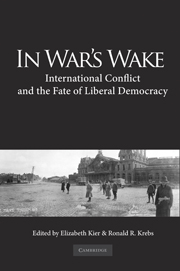Book contents
- Frontmatter
- Contents
- List of Contributors
- Acknowledgments
- 1 Introduction
- PART I WAR AND DEMOCRATIC TRANSITIONS: NEW AND DURABLE DEMOCRACIES?
- PART II WAR AND DEMOCRATIC PUBLICS: RESHAPING POLITICAL PARTICIPATION?
- PART III WAR AND DEMOCRATIC STATES: GOVERNMENT BY THE PEOPLE OR OVER THE PEOPLE?
- 9 International Conflict and the Constitutional Balance
- 10 Claims and Capacity
- 11 War, Recruitment Systems, and Democracy
- 12 Concluding Reflections
- References
- Index
10 - Claims and Capacity
War, National Policing Institutions, and Democracy
Published online by Cambridge University Press: 05 June 2012
- Frontmatter
- Contents
- List of Contributors
- Acknowledgments
- 1 Introduction
- PART I WAR AND DEMOCRATIC TRANSITIONS: NEW AND DURABLE DEMOCRACIES?
- PART II WAR AND DEMOCRATIC PUBLICS: RESHAPING POLITICAL PARTICIPATION?
- PART III WAR AND DEMOCRATIC STATES: GOVERNMENT BY THE PEOPLE OR OVER THE PEOPLE?
- 9 International Conflict and the Constitutional Balance
- 10 Claims and Capacity
- 11 War, Recruitment Systems, and Democracy
- 12 Concluding Reflections
- References
- Index
Summary
The formation of democratic states requires the reconciliation of two potentially antithetical processes: the construction of authoritative institutions and the development of modes of democratic participation. These two processes are, in practice, thoroughly intertwined, both conceptually, since state institutions are never fully separable from social interests, and causally, since social forces expressed through democratic mechanisms powerfully shape the state, even as authorities invent, alter, and channel social forces and their political organizations and behavior. One of the important ways that states affect democratic contestation is by policing the speech and actions of challenger groups – those that authorities identify as representing extreme and illegitimate ideologies. Wars affect these relationships in complex ways, by activating new or stronger forms of collective action, for example. This chapter focuses on one aspect of this larger developmental syndrome: Do wars generally augment state authority – here conceptualized as requiring both ideational claims and institutional capacity – in ways that affect the scope, practice, or quality of democracy?
The analysis is based on the assumption that police agencies, by their actions and inactions, enable legitimate and prohibit illegitimate social, civic, and political behavior. Scholars normally posit that wars favor institution-builders, including those building police agencies. Although the United States has enjoyed a secure geopolitical position compared to European nation-states, numerous large wars have still led to the construction of new executive powers and agencies.
- Type
- Chapter
- Information
- In War’s WakeInternational Conflict and the Fate of Liberal Democracy, pp. 211 - 234Publisher: Cambridge University PressPrint publication year: 2010
- 1
- Cited by



